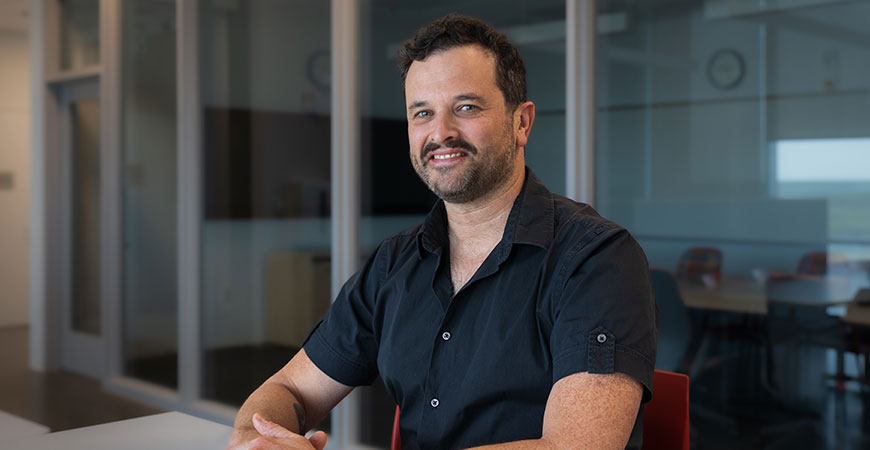
Professor Shahar Sukenik has been a faculty member for only 5 1/2 years, but he has already built an impressive resume, becoming a leader in his research field, an innovator and an exceptional communicator.
Those qualities helped him become UC Merced’s first recipient of the Alfred P. Sloan Foundation’s Sloan Research Fellowship.
Department of Chemistry and Biochemistry Chair Professor Ryan Baxter touted Sukenik’s work with intrinsically disordered proteins and his commitment to excellence when he nominated Sukenik for the prestigious and highly competitive award.
The Sloan Foundation announced today that Sukenik is one of 126 early-career researchers from the United States and Canada selected to receive this year’s fellowships.
Sukenik credits his collaborators and others — especially the graduate students in his lab — with much of his success.
“I think this award is primarily a testament to the high quality of work that the lab's graduate students have performed. Karina Guadalupe, Eduardo Flores, David Moses and Feng Yu have, together, built the research program this fellowship was awarded for from scratch,” Sukenik said. “The lab has expanded since then, and David and Feng recently graduated and are conducting research at top research institutions here in California. But it is the hard work of these individuals that set things in motion, so I mainly want to thank them for their trust, hard work, enthusiasm and perseverance.”
An extensive network of friends, mentors and collaborators helped Sukenik gain confidence and believe in and pursue his ideas, he said.
Sukenik is affiliated with the Health Sciences Research Institute and the Center for Cellular and Biomolecular Machines. His research deals with the interplay between proteins and their physical-chemical environment.
Specifically, he is looking at how intrinsically disordered proteins — a family of proteins that make up over 30% of the proteins in the human body — are affected by changes in their surroundings, Baxter explained.
Despite never having worked with disordered proteins during his training, Sukenik quickly established himself in the disordered protein research community, Baxter said in his nomination. Sukenik developed novel methods that allow unique insight into how these proteins function inside the cell and is pioneering the use of disordered proteins as sensors and actuators of their physical-chemical environment.
While the $75,000, two-year award will help Sukenik’s lab continue the work it has been doing, his proposal to the Sloan Foundation laid out some new directions that are not yet funded.
“Our overarching goal is to understand how small molecules that are abundant in the cell can affect the behavior of proteins — both ’standard,’ well-folded proteins as well as disordered proteins,” he explained. “We aim to show that the behavior of many of these molecular machines is ultimately determined by the chemical interactions between them and their surrounding environment. It is especially important in the context of a living cell — where proteins must function and in a chemical environment that is in constant flux due to routine cellular events or pathology.”
Awarded annually since 1955, the fellowships honor exceptional researchers whose creativity, innovation and research accomplishments make them stand out as the next generation of leaders, the Sloan Foundation said.
Open to scholars in seven fields — chemistry, computer science, Earth system science, economics, mathematics, neuroscience, and physics — the Sloan Research Fellowships are awarded in close coordination with the scientific community. Candidates must be nominated by their fellow scientists and winners are selected by independent panels of senior scholars based on a candidate’s research accomplishments, creativity and potential to become a leader in their field. More than 1,000 researchers are nominated each year, according to the Foundation. Many of the past recipients have gone on to receive Nobel Prizes, National Medals of Science and other prestigious awards.
Fellows from the 2024 cohort are drawn from a diverse range of 53 institutions across the U.S. and Canada, including large public university systems, Ivy League institutions and small liberal arts colleges.
"Sloan Research Fellowships are extraordinarily competitive awards involving the nominations of the most inventive and impactful early-career scientists across the U.S. and Canada,” said Adam F. Falk, president of the Alfred P. Sloan Foundation. “We look forward to seeing how Fellows take leading roles shaping the research agenda within their respective fields.”
Lorena Anderson

Senior Writer and Public Information Representative
Office: (209) 228-4406
Mobile: (209) 201-6255






